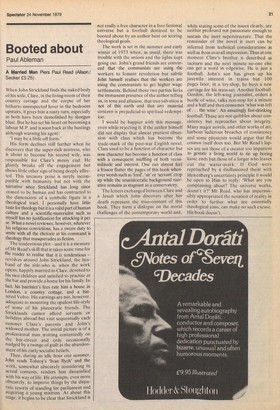Booted about
Paul Ableman
A Married Man Piers Paul Read (Alison/ Secker £5.25)
When John Strickland finds the naked body of his wife, Clare, in the living-room of their country cottage and the corpse of her hitherto unsuspected lover in the bedroom upstairs, it gives him a nasty turn, especially as both have been demolished by shotgun blast. But he has set his heart on becoming a labour M.P. and is soon back at the hustings although warning his agent: may be a little off form.'
His form declines still further when he discovers that the super-rich mistress, who is about to become his second wife, was responsible for Clare's messy end. He glumly breaks off the engagement but shows little other sign of being deeply affected. This uncanny poise is surely incompatible with humanity but not with the narrative since Strickland has long since ceased to be human and has contracted to the dimensions of a symbolic figure in a theological tract. I personally have little taste for theology but it is a valid part of human culture and a scientific-materialist such as myself has no justification for attacking it per se. What a novel reviewer, however, whatever his religious convictions, has a sworn duty to smite with all the rhetoric at his command is theology that masquerades as fiction.
The tendentious plot — and it is a measure of Mr Read's skill that it takes some time for the reader to realise that it is tendentious — revolves around John Strickland, the husband of the title,who is, when the work Opens, happily married to Clare, devoted to his two children and satisfied to practise at the bar and provide a home for his family. In fact, his barrister's fees rate him a house in London, a country cottage, and a battered Volvo. His earnings are not, however, adequate to mounting the opulent life-style of some , of his plutocratic friends. The Stricklands cannot afford servants or holidays abroad but visit sequentially each summer Clare's parents and John's Widowed mother. The initial picture is of a professional man trotting contentedly on the bar-circuit and only occasionally nudged by a twinge of guilt at the abandonment of his early socialist beliefs. Then, during an idle hour one summer, John reads Tolstoy's 'Ivan Ilych' and the work, somewhat obscurely considering its actual contents, renders him dissatisfied with his way of life. He attempts, even more Obscurely, to improve things by the disparate resorts of standing for parliament and acquiring a young mistress. At about this stage, it begins to be clear that Strickland is not really a free character in a free fictional universe but a football destined to be booted about by an author bent on scoring theological goals.
The work is set in the summer and early winter of 1973 when, as usual, there was trouble with the unions and the lights kept going out, John's grand friends are convinced that the communists are using the workers to foment revolution but subtle John himself realises that the workers are using the communists to get higher wage settlements. Behind these two parties lurks the immanent presence of the author telling us, in tone and allusion, that true salvation is not of this earth and that any material concern is prejudicial to spiritual redemption.
I would be happier with this message, even while rejecting it, if the author himself did not display that almost prurient obsession with class which has become the trade-mark of the post-war English novel. Class used to be A function of character but now character has become a function of class with a consequent muffling of both verisimilitude and interest. One can almost feel a frisson flutter the pages of this book whenever words such as 'lord', 'sir' or 'servant' crop up while the unaristocratic background narrative remains as stagnant as a conservatory.
The letters exchanged between Clare and a Jesuit which John discovers after her death represent the true content of this book. They form a dialogue On the moral challenges of the contemporary world and, while stating some of the issues clearly, are neither profound nor passionate enough to sustain the inert superstructure. That the remainder of the novel is inert can be inferred from technical considerations as well as from overall impression. Thus at one moment Clare's brother is described as taciturn and the next minute no-one else can get a word in edgewise. He is just a football. John's son has given up his juvenile interest in trains but 100 pages later, in a toy-shop, he buys a new carriage for his train-set. Another football. Gordon, the left-wing journalist, orders a bottle of wine, talks non-stop for a minute and a half and then consumes 'what was left of the wine'. An amazingly fast-drinking football. These are not quibbles about consistency but reproaches about integrity. Many major novels, and other works of art, harbour ludicrous breaches of consistency and some physicists would argue that the cosmos itself does too. But Mr Read's lapses are not those of a creator too impatient to gestate a living world to tie up boring loose ends but those of a forger who leaves out the water-mark. If God were reproached by a disillusioned theist with Heisenberg's uncertainty principle it would be open to Him to reply: 'What are you complaining about? The universe works, doesn't it?' Mr Read, who has impermissibly appropriated the notation of reality in order to further what are essentially theological aims, can make no such excuse. His book doesn't.


































 Previous page
Previous page